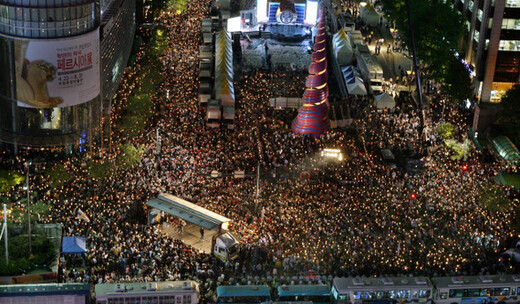hankyoreh
Links to other country sites 다른 나라 사이트 링크
[Analysis] President’s arrogance contributed to continued protests

Tens of thousands of Koreans opposed to American beef imports gathered once again at Seoul’s Cheonggyecheon Plaza on the evening of Friday, May 9, and at other locations around the country, despite a government announcement two days earlier, on May 7, that it would halt beef imports at any time there is a confirmed case of mad cow disease in the United States. Why are protesters’ candles still aflame?
The biggest reason would appear to be a complete loss of public confidence in the government on the issue of importing American beef. So serious is doubt in government statements at this point that an increasing number of people are hesitating to believe the government in spite of its change in position on the issue.
As 35 year-old Bak Min-cheol, a protester at the Cheonggyecheon Plaza on Friday, said, “They haven’t adequately informed us of the contents of the deal, so I can’t believe there’s not some twist behind the government’s latest plan” about how it will maintain the safety of meat on the market. This is as if to say that since the government agreed to a deal that was disadvantageous for Korea, and then tried to pretend all was well, its latest moves are likely just surface tinkering aimed at getting the government past the storm. It has become hard for a lot of people to believe what Lee’s government says when it asserts that cosmetic products are safe and that Americans eat the same beef exported by the United States, only to have the public learn that neither statement is accurate.
Arrogance on the part of the president made the situation worse. In April he said that people “don’t have to eat it if they don’t want to,” and on May 8 he said that “people have a choice in what they buy.” He has entirely written off people opposed to beef imports as “people opposed to the U.S.-Korea free trade agreement.” He has failed to grasp the real concerns the public has about the nation’s health and looked at the situation from a tactical perspective, as a crisis to surmount.
Another cause has been the thorough disregard for the country’s pride. A lot of Koreans think their government is acting like a spokesperson for the American beef industry. The public’s anger grew as it saw the government using its hard-earned taxes to run advertisements arguing the beef industry position in vernacular newspapers. The country’s pride was hurt when this approach on the part of the Korean government came to be compared with the deal Japan got on American beef. A photo of Korea’s president driving the U.S. president’s golf cart began a whirlwind tour of the Internet, and rumor that Korea had given up the Dokdo islands to Japan began circulating as well. This likely had something to do with hurt national pride.
Finally, Lee’s government misread public opinion. By the looks of it, the government does not understand how public sentiment is formed and how it spreads. It put too much confidence in the strength of the conservative media as symbolized by the so-called “Cho-Joong-Dong,” the Chosun Ilbo, JoongAng Ilbo, and the DongA Ilbo, three papers that were thoroughly left out of the whole flow of public discussion as it formed and spread over the Internet. It is only natural that the government was unable to read the direction public sentiment has been moving in. It failed to see the new channel of public opinion, in which opinion is formed by teenagers armed with mobile phones and the Internet and then spreads among older generations.
Please direct questions or comments to [englishhani@hani.co.kr]
Editorial・opinion
![[Column] Kim and Putin’s new world order [Column] Kim and Putin’s new world order](https://flexible.img.hani.co.kr/flexible/normal/500/300/imgdb/original/2024/0625/9617193034806503.jpg) [Column] Kim and Putin’s new world order
[Column] Kim and Putin’s new world order![[Editorial] Workplace hazards can be prevented — why weren’t they this time? [Editorial] Workplace hazards can be prevented — why weren’t they this time?](https://flexible.img.hani.co.kr/flexible/normal/500/300/imgdb/original/2024/0625/7817193028141614.jpg) [Editorial] Workplace hazards can be prevented — why weren’t they this time?
[Editorial] Workplace hazards can be prevented — why weren’t they this time?- [Editorial] Seoul failed to use diplomacy with Moscow — now it’s resorting to threats
- [Column] Balloons, drones, wiretapping… Yongsan’s got it all!
- [Editorial] It’s time for us all to rethink our approach to North Korea
- [Column] Why empty gestures matter more than ever
- [Editorial] Seoul’s part in N. Korea, Russia upgrading ties to a ‘strategic partnership’
- [Column] The tragedy of Korea’s perpetually self-sabotaging diplomacy with Japan
- [Column] Moon Jae-in’s defense doublethink
- [Column] S. Korea-China cooperation still has a long way to go
Most viewed articles
- 1Blaze at lithium battery plant in Korea leaves over 20 dead
- 2Foreign day laborers make up majority of death toll in Korean battery factory fire
- 3[Column] Kim and Putin’s new world order
- 4[Editorial] Workplace hazards can be prevented — why weren’t they this time?
- 5[Editorial] Seoul failed to use diplomacy with Moscow — now it’s resorting to threats
- 6After Putin’s Pyongyang summit, Seoul and Moscow play dangerous game
- 7What made Korea’s lithium battery plant fire so deadly
- 8How sanctions are backfiring to fuel a new Eurasian alliance
- 9Enough trash-slinging — it’s time to pursue ‘strategic communication’
- 10Russia’s actions will dictate what weapons Seoul may supply to Ukraine, security adviser says